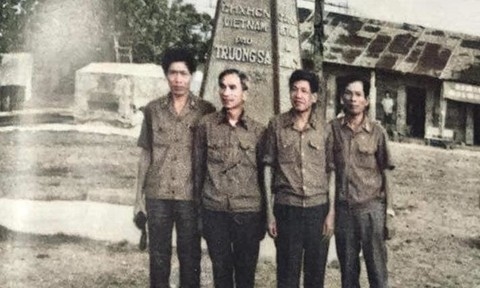Comrade Le Kha Phieu was 17 years older than me. He joined the military early in the resistance war against the French colonists, but since the first time we met till now, I’ve always called him “Brother” emotionally and respectfully. I always consider him a respectful commander, a teacher, and an older brother. In return, he always reserved his sentiment for me, considering me an affiliate and a younger brother at the same time. I am so proud of that!
    |
 |
|
Late Party General Secretary Le Kha Phieu (second from right) with the author in a joint photo on Truong Sa Islands in April 1992. (File photo: the author) |
I had a lot of memories with Comrade Phieu, but I would like to retell a remarkable visit to the Truong Sa Islands in April 1992. The working mission was led by him at his capacity as the Director of the General Department of Politics then.
On April 12, 1992, Ship HQ 957 (now 957) departed the military port of Ho Chi Minh City to start a journey to the far-off islands. During the journey, a lot of us got seasick despite the fact that HQ957 was a big and modern ship at that time. Although he was the Chief of the General Department of Politics, Comrade Phieu still stayed together with other members of the mission as he always did. He was simple and often stayed close to troops. During the journey, he sometimes played chess with us on the deck of the ship under golden rays of sunlight in the late afternoon. At times, undertows made even young members of the mission throw up. He, however, stayed as fit as a fiddle. He was 61 then.
When the ship reached some reefs, he also wore a yellow life-jacket and boarded the canoe together with us to visit troops on islets. In the blazing sun at sea, an old general with tanned skin visited the naval troops. It was so moving!
Under the dynamic direction of Comrade Phieu, we learnt about every aspect of life and work of the troops on all features and cays. Troops of the units stationed on the Spratly Islands greatly rejoiced when receiving the mission. When working with the units, he always gave important and convincing remarks, both encouraging and setting high requirements for the troops. The chief of the General Department of Politics touched upon strategic issues, but never failed to remind the troops of ordinary jobs like discipline observation, physical training, and support for fishermen.
For example, when working with the leadership of the Truong Sa (Spratly/Storm) Island, after listening to reports of the unit, he hailed the troops for striving to fulfill their tasks. The initial infrastructure built on the island helped raise our defense capabilities to protect national sovereignty and build up the on-spot combat force. However, according to Comrade Phieu, that was only the initial result for units at all levels and the whole country. The political chief of the Vietnam People’s Army required the troops stationed on the islands to heighten their vigilance. The safeguarding of national sovereignty over the Truong Sa Islands played a politically-, militarily-, and economically-important role in both immediate and long terms. He stressed that the nation should be militarily-strong in order to develop the economy, and that economic, military, and foreign affairs had to be closely combined in implementation to reach a common goal of maintaining national maritime sovereignty. “The Fatherland and the people have entrusted the armed forces with this historic mission,” he spoke to island troops.
By then, Vietnam had just conducted the cause of “doi moi” (renewal) for several years. Therefore, the socio-economic situation of the whole country was still difficult. Life and work of troops in general and those stationed on the Truong Sa Islands in particular were hard. Deeply understanding troops’ hardships, Comrade Phieu carefully studied every aspect of life and work on the islands. What he could do in his capacity, he gave directions and solutions on the spot. For those out of his capacity, he noted and continued to study more about them and then proposed to higher levels for solutions.
Concluding the journey, reaching Cam Ranh military seaport on April 21, 1992, he convened the mission for a meeting to collect ideas and drew lessons from the field trip. With the information from the ideas and lessons learnt, Lieutenant General Le Kha Phieu requested functional agencies to implement policies on political and ideological education, personnel, as well as to improve material and spiritual lives for troops stationed on the Truong Sa Islands. The policies, which have been supplemented and modified several times, were then gradually completed, contributing significantly to motivating and encouraging troops to fulfill tasks on far-off islands.
A quarter of a century has gone by, but the journey is still like yesterday to me. Various changes have been made since 1992; however, the strategic position of our Party, State, military and people on national seas and islands and our resolve to safeguard national maritime sovereignty remain unchanged.
Reciting journey to the Truong Sa Islands, in grief, I hope it would serve as the incense in tribute to Comrade Le Kha Phieu.
Farewell to the late Party General Secretary!
By Lieutenant General Nguyen Manh Dau, former Political Commissar of the General Technical Department
Translated by Huu Duong